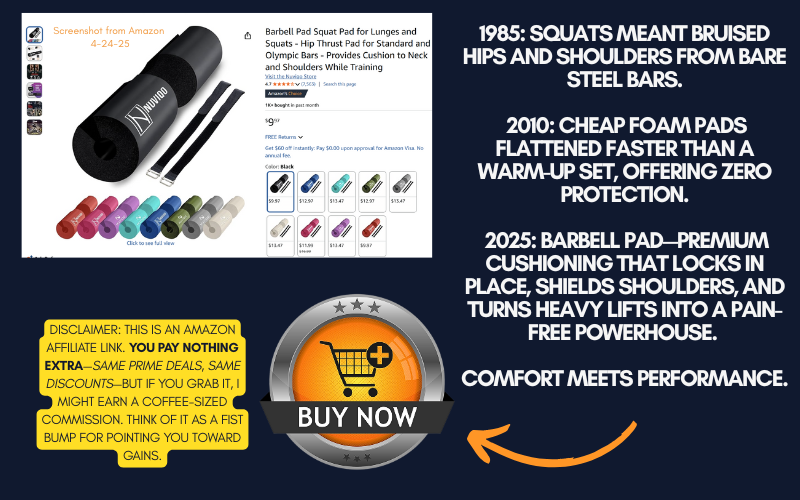Let’s cut through the chalk-dust fog: Are barbell pads worth it? If you’ve winced through hip thrusts or felt a barbell carve trenches into your shoulders, you’re already asking. “Is this pain necessary?” Spoiler: No. But pads aren’t for everyone. Let’s dissect who wins and who walks away.
“A pad isn’t a crutch—it’s a scalpel. Use it to carve out better form.” — Eugene Thong, CSCS
Who It’s For (And Who Should Skip It)
| For You If… | Not For You If… |
|---|---|
| Love hip thrusts, squats, lunges | Lift raw, swear by steel-on-skin grit |
| Want to reduce bruising | Prioritize max force transfer |
| Value comfort for high reps | Hate adjusting equipment mid-set |
Pros vs. Cons: The Unfiltered Breakdown
Pros
- Save Your Bones: High-density foam redistributes force, sparing your hips, shoulders, and neck.
- Focus on Muscle, Not Pain: “Discomfort distracts. A pad lets you zero in on the burn.” — Charles Damiano, B.S. Clinical Nutrition
- Quick-Slip Design: No fumbling. Strap it. Lift. Repeat.
- Customizable Swagger: Choose colors, logos—because looking strong fuels being strong.
Cons
- Thickness Trade-Off: Adds 0.5” between you and the bar. Might alter grip for purists.
- Not for Powerlifting: Comp lifts? Ditch the pad. Judges will side-eye you.

The Science of Softness
Barbell pads work by spreading pressure over a wider area. Think of it like snowshoes vs. stilettos: less force per square inch. For exercises where the bar rests on bone (hips during thrusts, traps during squats), this reduces localized strain.
But here’s the catch: Too much cushion = less stability. It’s a Goldilocks game. Our pad? 9mm dense sponge—thick enough to protect, thin enough to keep you honest.
Features That Matter (No Fluff)
- Quick-Slip Straps: No wrestling. Just click, lift, dominate.
- Fits Olympic Bars: 2” diameter? Covered.
- Anti-Sweat Grip: Because slipping mid-lunge is comedy gold… for everyone else.
“Raw” vs. “Padded” Lifting: A Tribal War
Raw Lifters crave the raw, unfiltered connection—steel on skin, pain as punctuation. Padded Lifters want to smash reps without nursing bruises tomorrow.
Which tribe are you?
- Team Raw: “Pain is the price of progress.”
- Team Padded: “Pain is optional. Gains are mandatory.”
Click here to SNAG YOURS NOW.
For the lifters who’d rather cry from reps, not barbell tattoos.
Quick note: These are Amazon affiliate links—you don’t pay a penny more, still snag all discounts, and you’ll help support our work (we may earn a small commission). Think of it as a fist bump for pointing you toward clean gain
6 Uncommon (But Critical) Q&A About Barbell Pads
A: Surprisingly, yes—but with a caveat. Front squats already shift weight to your quads and require a clean grip (elbows high, bar on fingertips). A pad here can help if collarbone pressure distracts you. But: The added bulk might destabilize the bar. Pro tip: Use a thinner pad (6mm) and prioritize grip drills.
“Front squats demand precision. A pad is a Band-Aid, not a fix.” — Eugene Thong
A: This is the “raw vs. padded” holy war. Some lifters swear the pad dulls “feedback,” like lifting in mittens. Others argue it sharpens focus by muting pain. Test it: Do a set with and without. If your form improves sans discomfort, the pad’s working. If reps feel “floaty,” ditch it.
A: Cheap foam? Absolutely. Sweat, friction, and UV light can turn bargain-bin pads into crumbly messes. Ours? High-density EVA foam resists sweat rot and won’t pancake after 100 hip thrusts. Warning: Never store it in a hot car trunk—it won’t melt, but it’ll get sticky.
A: We’ve seen it. Gym lore says duct tape + pool noodle = instant pad. But here’s the rub: Pool foam is too soft, compressing into uselessness under 50lbs. Save the noodles for the pool. For heavy lifts, only structured, high-density foam spreads force safely.
A: Trap bars sit lower on your back, so pressure points differ. But: If the pad’s strap system is adjustable, it can cushion those awkward angles. Key: Ensure the pad doesn’t ride up into your neck—it’ll feel like a foam boa constrictor.
A: Sciatica’s a nerve issue, not just pressure. A pad might reduce direct hip compression, but it’s not a cure. Critical: Pair it with glute activation drills and box squats to unload the spine. Always consult a physio first.
“A pad is a tool, not a treatment. Respect the root cause.” — Charles Damiano
The Final Rep
Barbell pads aren’t about being “soft.” They’re about smarter pain. If your goal is more volume, less wincing, this is your play. If you’re chasing one-rep maxes? Skip it.
“Tools don’t make the lifter. Smart lifters make tools work.” — Eugene Thong
So—worth it? Only if you want to keep squatting at 50 like you’re 25.
YOUR NEXT STEPS:

